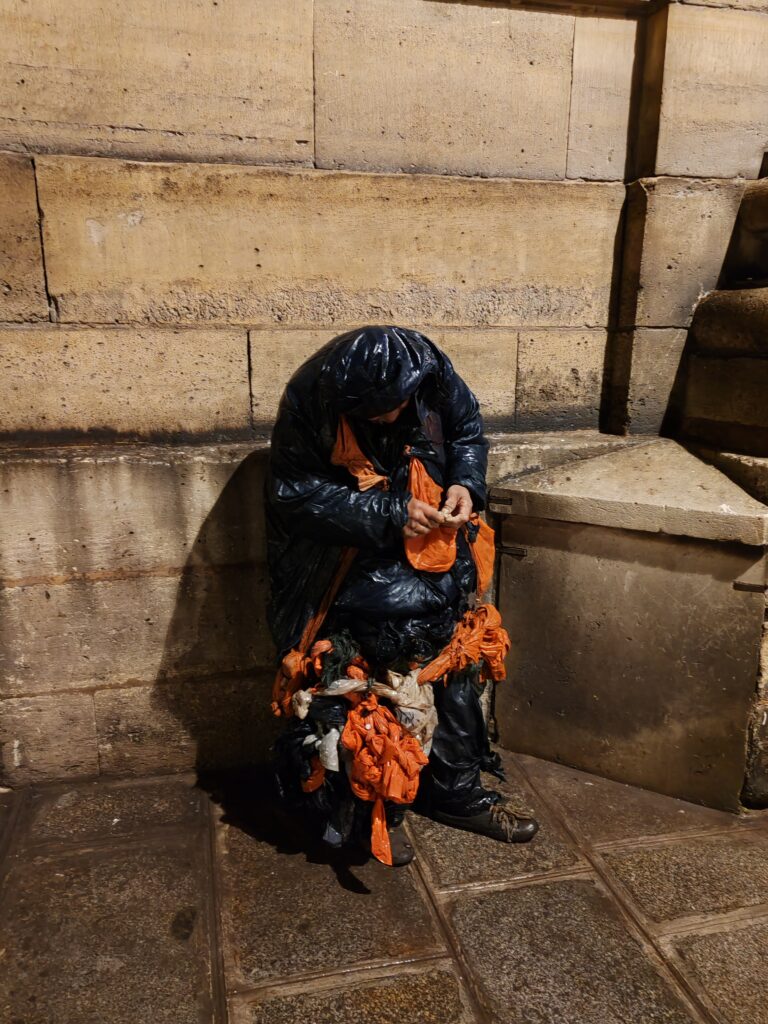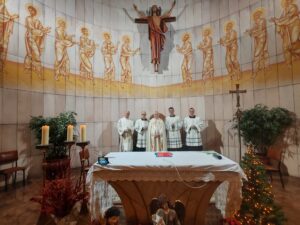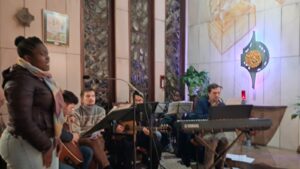The suffering of the homeless person on the street and that of the spiritually homeless person present both marked differences and profound similarities.
First of all, the homeless person on the street, who is often homeless, faces physical and material suffering. They endure harsh weather, hunger, lack of medical care and social rejection. Their struggle for daily survival is omnipresent, and they are often confronted with situations of violence or precariousness that accentuate their isolation. What’s more, urban homelessness is often accompanied by psychological problems such as depression, anxiety or substance use disorders. This suffering is tangible and visible, rooted in desperate living conditions.
In contrast, the spiritual itinerant, who can be defined as a person in search of meaning, seeks to transcend material limits and explore deeper dimensions of existence. Their suffering is often inner, linked to a sense of spiritual emptiness, a quest for truth or disillusionment with societal values. This itinerant may take a variety of spiritual paths, seeking to understand his or her place in the world through meditation, contemplation or religious practices. Although their struggles may be less visible, they can be just as intense, often marked by existential crises or painful questioning.

However, there are similarities between these two forms of homelessness. In both cases, there is an experience of isolation. The street homeless is often cut off from society, just as the spiritual homeless may feel alienated in a materialistic world, unable to find their place among those who do not share their quest. What’s more, both types of itinerant can feel a deep sense of despair about their situation, whether physical or spiritual. Each, in his or her own way, seeks some form of redemption or escape, whether through physical survival or spiritual uplift.
In conclusion, although the suffering of the street homeless and that of the spiritually homeless are rooted in different realities, they come together in the experience of isolation and the search for meaning. Each of these sufferings calls for compassion and reflection on the human condition, highlighting the diversity of struggles that individuals may go through in their search for well-being.

Spiritual itinerancy: a closer look
Spiritual itinerancy, in particular, can be exacerbated by experiences of desolation and lukewarmness. The Desert Fathers, those Christian monks of the 4th century, gave much thought to these issues. Saint Anthony the Great declared: “Sin is a serpent that wraps itself around the soul”, underlining how sin, if left unchecked, can stifle our spiritual life. Similarly, Saint John Cassian asserted: “Tepidity is the mother of all passions”, highlighting the danger of spiritual stagnation. Abba Poemen added: “He who does not concern himself with the state of his soul is like a man who travels without worrying about the direction he is taking.” These reflections illustrate the importance of self-examination and spiritual vigilance.
To overcome this spiritual desolation and lukewarmness, several steps can be taken. Regular prayer is essential to establish a strong bond with God. Participating in the sacraments, especially confession, offers an opportunity to receive forgiveness and renew spiritual commitment. Meditating on the Scriptures nourishes faith and helps combat desolation. What’s more, joining a spiritual community can boost motivation, as mutual help and support are crucial.
Practicing self-discipline through acts of asceticism helps to fight passions and refocus the heart on God. Cultivating gratitude helps to change perspective and recognize divine blessings. Finally, seeking the accompaniment of a spiritual guide can offer tailored advice for progressing in the life of faith.
In short, although the sufferings of the street homeless and the spiritually itinerant are rooted in different realities, they come together in the experience of isolation and the search for meaning. The teachings of the Desert Fathers remind us that, whatever the nature of our suffering, vigilance and constant effort are necessary to stay on the path of resilience and faith.
Quotes from the Desert Fathers
- Saint Anthony the Great: “Sin is a serpent that coils around the soul.” This image highlights how sin, if left unchecked, can stifle our spiritual life.
- Saint John Cassian: “Tepidity is the mother of all passions.” This quote highlights the danger of spiritual stagnation, which can lead to desolation.
- Abba Poemen: “He who does not concern himself with the state of his soul is like a man who travels without worrying about the direction he is taking.” This thought underlines the importance of self-examination and spiritual vigilance.

How to get out of it!
To overcome this spiritual desolation and lukewarmness, several steps can be considered:
- Prayer practice: Regular prayer is essential. It helps establish a strong bond with God. Engaging in prayers of repentance and petition for grace can help revitalize the spiritual life. “Prayer is the light of the soul” (St. John Chrysostom).
- Sacraments: Participating in the sacraments, especially confession, offers an opportunity to receive forgiveness and renew spiritual commitment. “The sacrament of penance is a way back to the Father” (Pope Francis).
- Reading the Scriptures: Meditation on the Scriptures can help nourish faith and combat desolation. The words of the Bible often bring comfort and direction.
- Community: Joining a spiritual community or prayer group can boost motivation. Mutual help and support are crucial to the spiritual journey.
- Asceticism and Discipline: Practicing personal discipline through acts of asceticism (fasting, silence, solitude) helps to combat passions and refocus the heart on God. “The struggle against oneself is the greatest of all battles” (Abba Dorothée).
- Spirituality of Gratitude: Cultivating gratitude in daily life helps to change perspective and recognize divine blessings, even in difficult times.
- Spiritual guidance: Seeking the support of a spiritual guide can offer advice and strategies tailored to your personal situation, enabling you to move forward with discernment in your life of faith.
In short, spiritual itinerancy, marked by desolation and sin, can be overcome by assiduous practice of prayer, the sacraments, Scripture reading, and commitment to a spiritual community. The teachings of the Desert Fathers remind us that vigilance and constant effort are necessary to stay on the path of faith.



